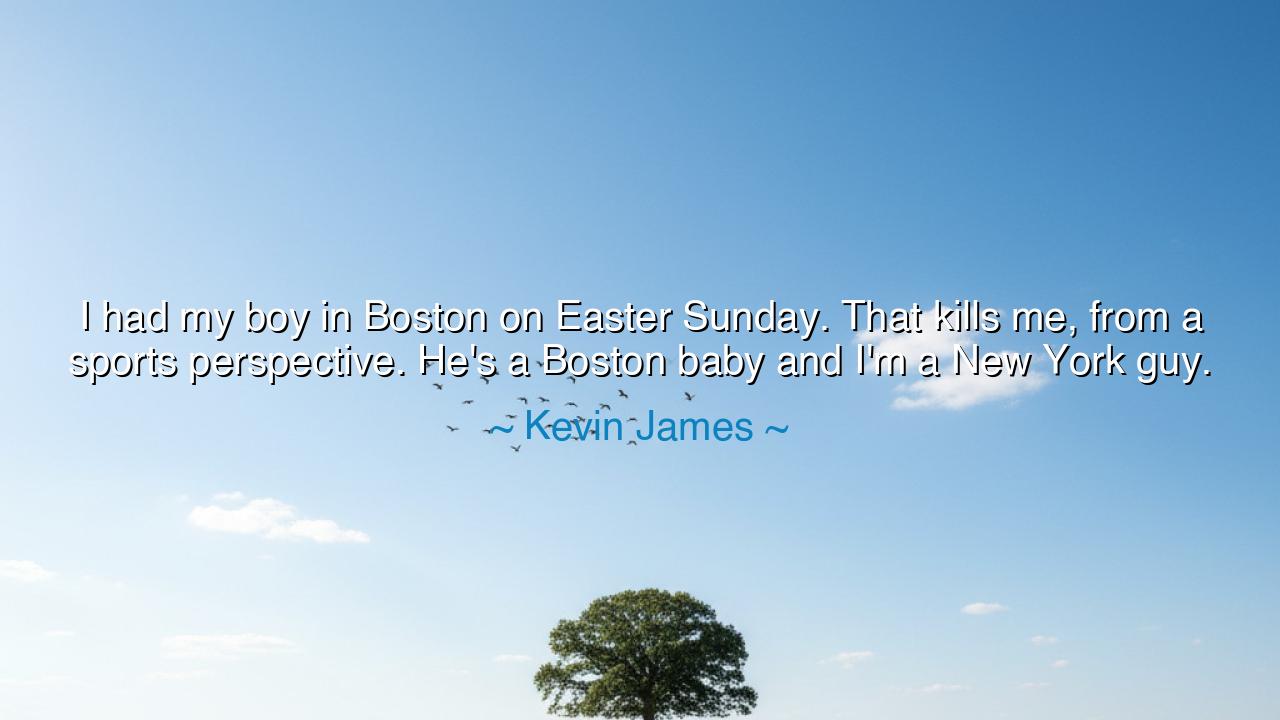
I had my boy in Boston on Easter Sunday. That kills me, from a
I had my boy in Boston on Easter Sunday. That kills me, from a sports perspective. He's a Boston baby and I'm a New York guy.






The words of Kevin James—“I had my boy in Boston on Easter Sunday. That kills me, from a sports perspective. He's a Boston baby and I'm a New York guy”—though spoken with humor, carry within them the echoes of something older and deeper: the eternal tension between identity and inheritance, between the worlds we are born into and the ones we create. What begins as a jest about sports rivalry becomes, in its essence, a reflection on the unbreakable threads of belonging, pride, and the strange ways life chooses to humble even the most loyal of hearts.
For to be “a New York guy” and to have one’s son born “in Boston” is not, to James, a trivial matter—it is a symbolic fracture in the sacred continuity of allegiance. In the world of sports, where cities stand as tribes and team colors are the banners of loyalty, such an event feels almost mythic: the heir born among the rivals, the son destined to carry a mark foreign to the father’s blood. Beneath the laughter, one feels the quiet ache of tradition interrupted, the wistful awareness that life often writes stories that mock our pride.
The ancients would have understood this sentiment well. In the old cities of Greece, a man’s polis was not merely where he lived—it was who he was. To be Athenian or Spartan was a matter of soul as much as soil. And when alliances shifted, or when a child was born in the land of an enemy, it was seen not as chance but as fate’s quiet mischief, testing loyalty and reminding mortals of their smallness before destiny. So too, in Kevin James’s simple confession, we glimpse this timeless truth: that love and identity do not always dwell in harmony, and that even in something as light as sport, the heart still wrestles with the pull of heritage.
Yet it is no coincidence that his son was born on Easter Sunday, a day that in Christian tradition symbolizes rebirth and renewal. Easter is the celebration of life rising from death, of new beginnings triumphing over old divisions. It is as though the universe chose that moment to remind the father that every generation begins anew. The son may be born in another city, under another flag, but he carries both worlds within him. Where the father sees rivalry, the child embodies reconciliation—a bridge between two great houses, bound not by competition but by kinship.
Consider, too, how this tale mirrors the greater story of human legacy. Every parent, in one way or another, must face the humbling truth that their children will not be copies of themselves. They will belong to their own age, shaped by new places, new ideas, new loyalties. The father who dreamed of raising a New York son must now watch as his boy may grow to cheer Boston victories instead. It is the quiet pain of every generation—to give life and yet surrender control. But in that surrender lies the beauty of growth, the proof that love transcends even rivalry.
We can see reflections of this same truth in history. When Alexander the Great marched beyond Greece and founded cities across Asia, many of his generals feared the mingling of cultures. But Alexander saw wisdom in it. He believed that blending differences creates strength, that from the union of opposites comes harmony. His empire was not destroyed by the merging of worlds—it was made richer. So too, in this small family moment, we see that the son’s Boston birth is not a betrayal of New York blood, but the beginning of a broader inheritance—a legacy that joins rather than divides.
And so, the lesson is simple but profound: identity must evolve, or it withers. Hold your roots with pride, but let your branches grow in new directions. The rivalries of today—whether between cities, nations, or ideas—should never outweigh the bonds of love and family. For in the end, no matter where a child is born, what truly defines him is not the city of his birth, but the heart of the one who raises him.
Thus, Kevin James’s humorous lament becomes a quiet parable for all who cling too tightly to the boundaries of belonging. Life will always find a way to remind us that love is greater than loyalty, that family outlasts fandom, and that the soul of a man is not confined to a city’s borders. The father may jest that “it kills him,” but deep within those words is the wisdom of acceptance—the knowledge that every new beginning, even one born among rivals, carries the chance to heal old divides and to build something greater than either city could alone.






AAdministratorAdministrator
Welcome, honored guests. Please leave a comment, we will respond soon